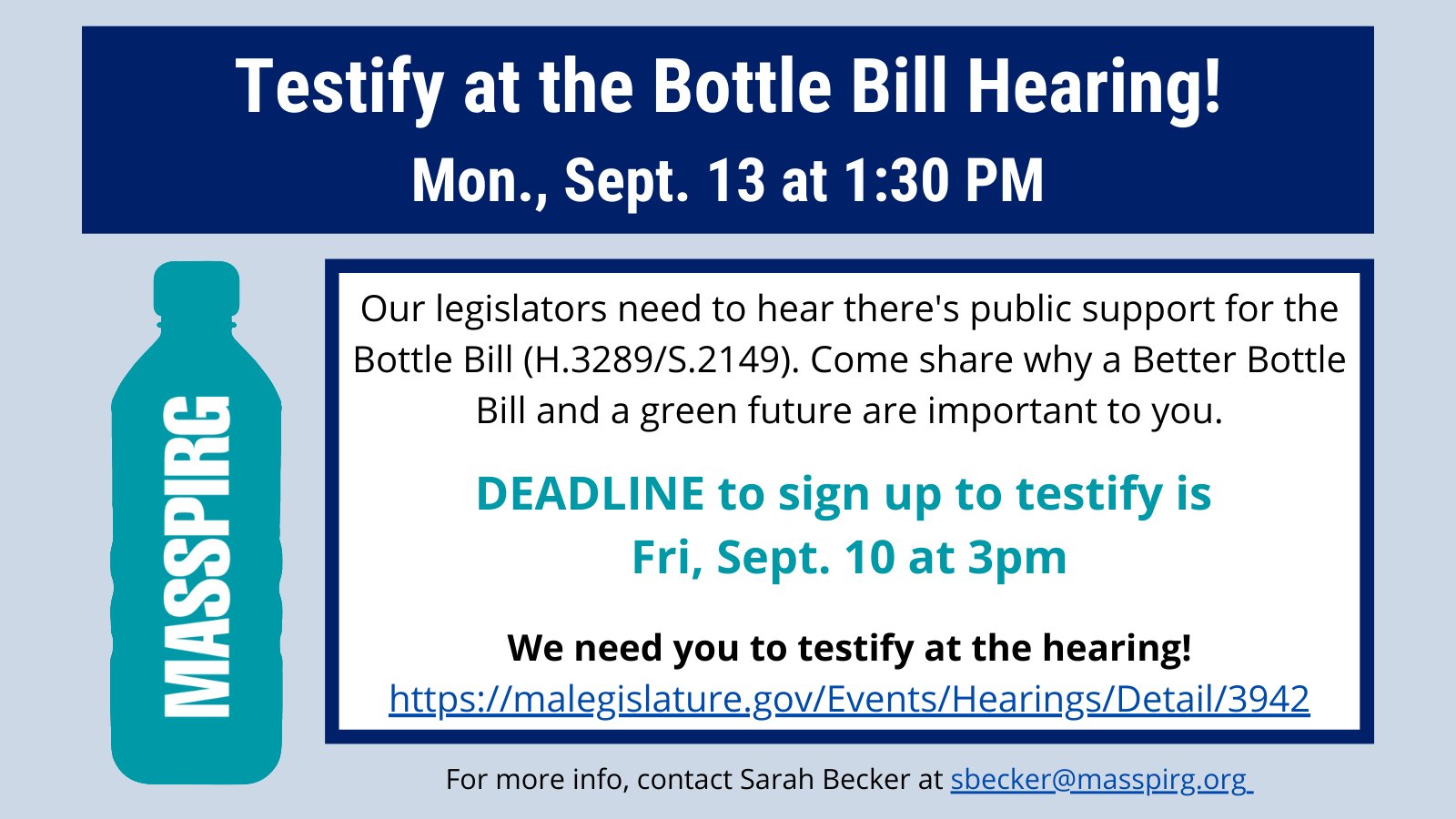
MASSPIRG calls for updating bottle deposit law
MASSPIRG strongly supports H 3289/ S 2149, An Act to Expand the Bottle Bill.

MASSPIRG Testimony to the Joint Committee on Telecommunications, Utilities, and Energy
FROM: Sarah Becker, Zero Waste Campaign Associate, MASSPIRG; Janet Domenitz, Director, MASSPIRG
TO: Chair Jeffrey Roy, Chair Michael Barrett, and Members of the Joint Committee on Telecommunication, Utilities, and Energy
September 13, 2021
RE: H.3289/S.2149 — MASSPIRG — Support
Dear Chair Roy, Chair Barrett, and members of the Committee,
MASSPIRG strongly supports H 3289/ S 2149, An Act to Expand the Bottle Bill.
The number of beverage containers we throw away each year is part of Massachusetts’ waste problem, and it is getting worse. There are three brief points I want to make about that. First, over the past decade, Massachusetts has continued to produce an average of 5 and a half million tons of waste every year.[1] We were producing 5.4 million tons of waste in 2010 and we produced 5.5 million tons in 2019.[2] We are not making progress, and we need to.
Second, beverage containers are part of this waste stream. As of a few years ago, we were throwing away 1 billion beverage containers every year.[3] That means they either end up as litter, are sent to one of Massachusetts’ 19 landfills or 7 incinerators, or they get exported to a landfill or incinerator out of state.[4] [5]
These facilities are dangerous polluters that are bad for both our health and the environment. Landfills release toxic leachate that pollutes our groundwater when it seeps into our soil, and incinerators emit heavy metals, carcinogens, and other pollutants into the air we breathe.[6] [7] Getting beverage containers out of these facilities is a step towards reducing our waste problem.
Third, we know that updated bottle bills work to divert usable materials out of our trash. Bottle bills in other states with higher deposits that cover more types of containers have the kind of return rates we want to see. Oregon saw their redemption rate jump from 64% to 90% when they adopted these changes.[8] Michigan has a redemption rate of 89% and since updating their bottle bill has seen their waste stream reduced by 6-8% each year.[9] And more states are moving in that direction. Connecticut passed a bill this year to accept more types of containers and double their deposit.[10] Massachusetts was among the first states to adopt a Bottle Bill, but our leadership is flagging because our bill needs modernizing, which is exactly what Rep. Decker and Sen. Creem intend to do with this bill before you. We appreciate the committee’s consideration and hope you will give H.3289/S.2149 a favorable report.
[1] Massachusetts Department of Environmental Protection. (2020). 2019 Solid Waste Data Update. Retrieved from https://www.mass.gov/doc/2019-solid-waste-data-update/download?_ga=2.19610808.1247327305.1631307880-708760428.1629471929.
[2] Ibid.
[3] Mass.Gov Staff. (2014, Jul.). “9 Easy Ways to Start Recycling in Massachusetts”. Mass.Gov Blog. Retrieved from https://blog.mass.gov/blog/environment-2/9-easy-ways-to-start-recycling-in-massachusetts/.
[4] MassDEP. (2020). “Active Landfills”. Retrieved from https://www.mass.gov/doc/list-of-active-landfills-in-massachusetts-january-2020/download.
[5] MassDEP. (2020). “Active Combustion Facilities”. Retrieved from https://www.mass.gov/doc/list-of-active-combustion-facilities-in-massachusetts-january-2020/download.
[6] Mihaley, E. (2019, Sept.). “Is Toxic Landfill Wastewater Coming to a Stream or Farm Near You?”. Conservation Law Foundation. Retrieved from https://www.clf.org/blog/toxic-landfill-leachate-drinking-water/.
[7] MassDEP. (2021). Municipal Waste Combustors. Retrieved from https://www.mass.gov/guides/municipal-waste-combustors.
[8] Profita, C.(2019, Feb.). Oregon Bottle Deposit System Hits 90 Percent Redemption Rate. NPR. Retrieved from https://web.archive.org/web/20210825221306/https://www.npr.org/sections/thesalt/2019/02/04/688656261/oregon-bottle-deposit-system-hits-90-percent-redemption-rate.
[9] Container Recycling Institute. (n.d.). Bottle Bills Promote Recycling and Reduce Waste. Bottle Bill Resources Guide. Retrieved from https://web.archive.org/web/20210827130646/https://www.bottlebill.org/index.php/benefits-of-bottle-bills/bottle-bills-promote-recycling-and-reduce-waste
[10] Quinn, M. (2021, Jun.). “Connecticut governor signs bottle bill updates into law, doubling deposit value”. WasteDive. Retrieved from https://www.wastedive.com/news/connecticut-bottle-bill-update-governor-lamont/601376/.
Topics
Authors
Janet Domenitz
Executive Director, MASSPIRG
Janet has been the executive director of MASSPIRG since 1990 and directs programs on consumer protection, zero waste, health and safety, public transportation, and voter participation. Janet has co-founded or led coalitions, including Earth Day Greater Boston, Campaign to Update the Bottle Bill and the Election Modernization Coalition. On behalf of MASSPIRG, Janet was one of the founding members of Transportation for Massachusetts (T4MA), a statewide coalition of organizations advocating investment in mass transit to curb climate change, improve public health and address equity. Janet serves as Chair of the Board of Directors for the Consumer Federation of America and serves on the Common Cause Massachusetts executive committee, Alliance for a Healthy Tomorrow board of directors, and Department of Environmental Protection Solid Waste Advisory Committee. For her work, Janet has received Common Cause’s John Gardner Award and Salem State University’s Friend of the Earth Award. Janet lives in Cambridge, Massachusetts, with her husband and two sons, and every Wednesday morning she slow-runs the steps at Harvard Stadium with the November Project.
Find Out More

A look back at what our unique network accomplished in 2023

PIRG’s warmest wishes for a safe and happy new year

More joy, less waste this holiday season

